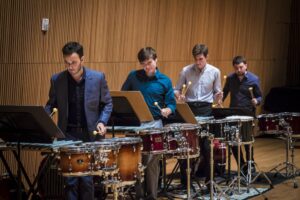EL NIÑO: NATIVITY RECONSIDERED
An AMOC* Production
This chamber music arrangement—written specially for AMOC*—was first performed at The Met Cloisters in 2018, in the beautiful San Martín at Fuentidueña chapel. The New York Times called it “intimate, affecting and quietly rich with activism.” The piece, which celebrates Latin American poets and the voices of women, returned for a one-night-only engagement in December 2022 at the Cathedral of St. John the Divine in New York City. A rarely performed work, El Niño “ruminates on the notion that with the promise of new life, there is the equal threat of inexplicable violence and sacrifice,” said Bullock, “one of opera’s fastest-rising stars” (Vanity Fair), who curated the selections being performed.
Music by JOHN ADAMS
Libretto compilation by PETER SELLARS
Musical selections by JULIA BULLOCK
Musical arrangement by CHRISTIAN REIF
JULIA BULLOCK, soprano
JASMIN WHITE*, contralto
ANTHONY ROTH COSTANZO, countertenor
DAVÓNE TINES, bass-baritone
TOD BRODY*, flute
RONI GAL-ED*, oboe
GLEB KANASEVICH*, clarinet
ALEXANDER DAVIS*, bassoon
PRISCILLA RINEHART*, horn
CONOR HANICK, piano
JOHN ARIDA*, keyboard
JONNY ALLEN, percussion
JORDAN DODSON*, guitar
KEIR GOGWILT, MIRANDA CUCKSON, MIRAN KIM*, QIANWAN SHEN*, violin
ZÖE MARTIN-DOIKE*, CARRIE FREY*, viola
COLEMAN ITZKOFF, SETH PARKER WOODS*, cello
DOUG BALLIETT, CHRISTOPHER JOHNSON*, double bass
CHRISTIAN REIF*, conductor
CHRISTOPHER GILMORE*, lighting design
RR SIGEL*, tour producer
BETSY AYER*, production stage manager
JENNIFER CHEN, music supervisor
ZACK WINOKUR, director
* denotes guest artist
Premiered December 2018 at The Met Cloisters, Fuentidueña Apse, New York, NY
Production photos by Nina Westervelt
Program Note
by Julia Bullock
Traditions develop out of passionate reactions to events. The nativity story and themes that surround it have preoccupied us for centuries –– the unique relationship between birthing parent and child, acts of generosity, and how the promise of new life (or evolution) is often accompanied by a threat and enactment of violence. That’s part of why at the end of each calendar year we seek out opportunities to consider the past cycles we find inescapable.
While the Christian doctrine is steeped in patriarchal structures and often shared through the lens of Western-European perspectives, “El Niño” brings the voices of women and Latin American poets to the forefront. Contrasting moments of intimate immediacy and ferocious power are what struck me when I first heard the original work by John Adams and Peter Sellars, and they’re what inspired me to find a way to share this piece with as many people and communities as possible.
It’s meaningful to present El Niño: Nativity Reconsidered in this distilled version — whether in the concert hall or a place of spiritual worship — because anywhere we choose to congregate can be considered sacred when we hear stories, reflect on lessons from those narratives, and witness each other in the process.
Thank you for joining us for this offering, which I do hope will become a tradition.
With warmth and respect,
Julia Bullock
Translations
Translations by JULIA BULLOCK and MYRNA DIAZ.
With Spanish Language Biblical text from the Reina-Valera Bible. Special thanks to ELENA PULGAR LONZACO and JOSE MANUEL CRUZ VELAZQUEZ.
The libretto you hear presented on the stage is in bold, with its translation to the right (or below on mobile). Or read a PDF version here.
THE ANNUNCIATION
THE ANNUNCIATION
Rosario Castellanos (Mexico, 1925 – 1974)
from The Sterile Virgin (1950)
Because since the beginning you were destined to be mine.
Before the ages of wheat and of the lark
and even before the fishes.
When God had nothing more than horizons
of unlimited blue and the universe
was a will not yet pronounced.
When everything lay in the divine lap,
intermingled and confused,
you and I lay there, complete, together.
Because since the beginning you were destined to be mine.
And here, you announce yourself.
Among contradictory angels you approach,
pouring yourself like a soft music,
like a glass of aromas and balsams.
You exalt my humility,
Your gaze, benevolent,
Transforms my wounds into ardent splendors.
And now, you approach
And you find me surrounded by prayers
Like high leaping flames.
LA ANUNCIACIÓN (extracto)
Rosario Castellanos (México, 1925 – 1974)
de De la vigilia estéril (1950)
Porque desde el principio me estabas destinado.
Antes de las edades del trigo y de la alondra
y aun antes de los peces.
Cuando Dios no tenía más que horizontes
de ilimitado azul y el universo
era una voluntad no pronunciada.
Cuando todo yacía en el regazo
divino, entremezclado y confundido,
yacíamos tú y yo totales, juntos.
Porque desde el principio me estabas destinado…
He aquí que te anuncias.
Entra contradictorios ángeles te aproximas,
como una suave música te viertes,
como un vaso de aromas y de bálsamos.
Por humilde me exaltas,
Tu mirada, benévola,
Transforma mis llagas en ardientes esplendores.
He aquí que te acercas
Y me encuentras rodeada de plegarias
Como de hogueras altas.
SE HABLA DE GABRIEL
1. SE HABLA DE GABRIEL *
Rosario Castellanos (México, 1925 – 1974)
Como todos los huéspedes
mi hijo me estorba ocupando un lugar que era mi lugar
existiendo a deshonra,
haciéndome partir en dos cada bocado.
Fea, enferma, aburrida,
lo sentía crecer a mis expensas,
robarle su color a mi sangre,
añadir un peso y un volumen clandestinos
a mi modo de estar sobre la tierra.
Su cuerpo me pidió nacer, cederle el paso;
darle un sitio en el mundo,
la provisión de tiempo necesaria a su historia.
El paso, el paso.
Consentí.
Y por la herida en que partió,
por esa hemorragia de su desprendimiento
se fue también lo último que tuve de soledad,
de yo mirando trás de un vidrio.
Quede abierta, ofrecida
a las visitaciones, al viento
Quedé abierta a la presencia.
* El hijo del poeta Castellano, Gabriel, nació en 1961.
Apocryphal Gospel of James
(coda of GABRIEL WAS SPOKEN OF)
Now I, Joseph, was walking about
and I looked up and saw the heaven standing still,
and I observed in amazement,
and the birds of heaven at rest.
I looked down at the earth
and I saw a vessel lying there,
and workmen reclining,
and their hands were in the vessel.
Those who were chewing did not chew.
Those who were lifting did not lift up,
and those who were carrying to their mouths
did not carry, but all faces were looking upward.
I saw sheep standing still,
and the shepherd raised his hand to strike them,
but his arm remained up.
I observed the streaming river,
and I saw the mouths of the kids and the water,
but they were not drinking.
The winds stopped; they made no sound:
there was no motion of tree leaves.
The streams did not flow;
there was no motion of the sea.
The maiden stood looking intently into heaven.
1. TALK OF GABRIEL *
Rosario Castellanos (Mexico, 1925 – 1974)
Like all my guests my son impeded me,
occupying a place that was my place,
existing at inopportune times,
making me divide each bite in two.
Ugly, sick, bored,
I felt him grow at my expense,
steal the color from my blood,
add clandestine weight and volume
to my way of being on the earth.
His body asked to be born, to yield to his passing,
to give him his place in the world
the provision of time necessary for his history.
I consented.
And through the wound of his departure,
through the hemorrhage of his detachment,
also went the last of my solitude,
looking alone behind a glass.
I remained open, offered
to the visitations, to the wind,
to presence.
* Poet Castellano’s son, Gabriel, was born 1961
Evangelio apócrifo de Jacobo
(coda de SE HABLA DE GABRIEL)
Ahora yo, José, caminaba,
y miré hacia arriba y ví detenido el Cielo,
y observé en asombro,
y las aves del Cielo en descanso.
Y miré hacia abajo a la tierra
y ví allí una vasija,
y los obreros reclinaban,
y sus manos dentro de la vasija.
Aquellos que masticaban no masticaron.
Aquellos que levantaban no levantaron,
y aquellos que no comían
no comieron, pero todos miraban hacia arriba
Ví ovejas detenidos en su lugar,
y el pastor levantaba la mano para golpearlas,
pero su brazo permaneció en alto.
Y observé el río que fluye,
y ví las bocas de los corderos y el agua,
pero no bebían.
Y los vientos se detuvieron en silencio:
no había movimiento en las hojas de los árboles
Los arroyos no fluían;
no había movimiento en el mar.
La doncella se quedó mirando intensamente al Cielo.
MAGNIFICAT
2. MAGNIFICAT
King James Version (1604 – 1611)
Luke 1: 46-55
And Mary said,
My soul doth magnify the Lord,
and my spirit hath rejoiced in God my Saviour.
For he hath regard the low estate of his handmaiden:
for, behold, from henceforth,
all generations shall call me blessed.
For he that is mighty hath done to me great things;
and holy is his name.
And, his mercy is on them that fear him
from generation to generation.
For he hath shown his strength with his arm;
he hath scattered the proud
He hath put down the mighty from their seats,
and exalted them of low degree.
He hath filled the hungry with good things,
and the rich he hath sent empty away.
He hath helped his servant Israel
in remembrance of his mercy;
As he spake to our fathers, to Abraham,
and to his seed for ever.
2. MAGNIFICAT
Reina-Valera Versión
San Lucas 1: 46-55
Entonces María dijo:
Engrandece mi alma al Señor;
Y mi espíritu se alegró en Dios mi Salvador.
Porque ha mirado á la bajeza de su criada;
porque he aquí, desde ahora
me dirán bienaventurada todas las generaciones.
Porque me ha hecho grandes cosas el Poderoso;
y santo es su nombre.
Y su misericordia de generación á generación
á los que le temen.
Hizo valentía con su brazo:
esparció los soberbios
Quitó los poderosos de los tronos,
y levantó á los humildes.
A los hambrientos hinchió de bienes;
y á los ricos envió vacíos.
Recibió á Israel su siervo,
acordándose de la misericordia,
Como habló á nuestros padres á Abraham
y á su simiente para siempre.
SHAKE THE HEAVENS
3. SHAKE THE HEAVENS
King James Version (1604 – 1611)
Haggai 2: 6-7
For thus saith the Lord […] :
Yet once, it is a little while,
and I will shake the heavens
and the earth and the sea and the dry land.
And the desires of all the nations shall come.
And I will fill this house with glory.
And in this place, I will give peace.
They drew near to Bethlehem.
They were three miles distant,
and Joseph turned and saw Mary weeping
and he said
“Probably that which is in her is distressing her.”
Once again Joseph turned and saw her laughing,
and he said:
“Mary, how is it that I see your face at one moment laughing and at another time weary?”
She said to Joseph,
“It is because I see two peoples with my eyes,
the one weeping and mourning,
the other rejoicing and glad.”
3. SACUDE LOS CIELOS
Reina-Valera Version
Haggeo 2: 6-7
Porque así dice Dios […]:
De aquí á poco aun haré
yo temblar los cielos
y la tierra, y la mar y la seca.
Y vendrá el Deseado de todas las gentes.
y henchiré esta casa de gloria,
y daré paz en este lugar.
Evangelio apócrifo de Santiago
Se acercaron hacia Belén.
Estaban a tres millas de distancia,
y volteó José y vió a María llorar
y dijo
“Probablemente lo que hay en ella la está angustiando.”
Otra vez volteó José y la vió reir,
y dijo:
“María ¿cómo es que veo tu rostro unas veces
riendo y otras veces cansada?”
Le dijo a José,
“Es porque veo en mis ojos dos pueblos,
el que llora y se lamenta,
el otro regocijado y contento.”
PUES MI DIOS NACIDO A PENAR
4. PUES MI DIOS NACIDO A PENAR – VILLANCICO V *
(NAVIDAD, 1689, no. 287)
Sor Juana Inés de la Cruz (Mexico, 1648 – 1695)
Pues mi Dios ha nacido a penar,
déjenle velar.
Pues está desvelada por mi
déjenle dormir.
Déjenle velar,
que no hay pena, en quien ama,
como no penar.
Déjenle dormir,
que quien duerme, en el sueño
se ensaya a morir.
Silencio, que duerme.
Cuidado, que vela…
Déjenle velar.
Déjenle dormir.
4. BECAUSE MY LORD WAS BORN TO SUFFER
(CHRISTMAS, 1689, no. 287)
Sor Juana Inés de la Cruz (Mexico, 1648 – 1695)
Since my God was born to suffer,
let him stay awake.
Since he stays awake for me,
let him sleep.
Let him stay awake,
for there is no pain,
in one who loves as if there’s no suffering.
Let him sleep,
for one who sleeps,
while dreaming, rehearses death.
Silence, let him sleep.
Take care, let him stay awake…
Let him stay awake.
Let him sleep.
WHEN HEROD HEARD
5. WHEN HEROD HEARD
King James Version (1604 – 1611)
Matthew 2: 1-3, 7-8
Now when Jesus was born in Bethlehem of Judea
in the days of Herod the king, behold,
there came wise men from the east to Jerusalem, saying,
“Where is he that is born King of the Jews?
for we have seen his star in the East
and have come to worship him.”
Now when Herod the king had heard these things,
he was troubled […] and he privily called his wise men,
inquired of them diligently what time the star appeared.
And he sent them to Bethlehem, saying,
“Go and search diligently for the young child;
and when you have found him bring me word again
that I may come and worship him also.”
5. CUANDO HERODES ESCUCHÓ
Reina-Valera Version
San Mateo 2: 1-3, 7-8 (p. 2391)
Y como fué nacido Jesús en Bethlehem de Judea
en días del rey Herodes,
he aquí unos magos vinieron del oriente á Jerusalem, Diciendo:
¿Dónde está el Rey de los Judíos, que ha nacido?
porque su estrella hemos visto en el oriente,
y venimos a adorarle.
Y oyendo esto el rey Herodes,
se turbó,[…] y llamando en secreto á los magos,
entendió de ellos diligentemente el tiempo del aparecimiento de la estrella;
Y enviándolos á Bethlehem, dijo:
Andad allá, y preguntad con diligencia por el niño;
y después que le hallareis, hacédmelo saber,
para que yo también vaya y le adore.
AND THE STAR WENT BEFORE THEM
6. AND THE STAR WENT BEFORE THEM
King James Version (1604 – 1611)
Matthew 2: 9, 11
When they had heard the king, they departed;
and, lo, the star which they saw in the east,
went before them,
till it came and stood over where the young child was.
And when they were come into the house,
they saw the young child with Mary his mother,
and fell down and worshiped him:
and when they had opened their treasures,
they presented unto him gifts;
gold, frankincense, myrrh.
6. Y LA ESTRELLA IBA DELANTE DE ELLOS
Reina-Valera Version
Mateo 2: 9, 11 (p. 2392)
Y ellos, habiendo oído al rey, se fueron:
y he aquí la estrella que habían visto en el oriente,
iba delante de ellos,
hasta que llegando, se puso sobre donde estaba el niño.
Y entrando en la casa,
vieron al niño con su madre María,
y postrándose, le adoraron;
y abriendo sus tesoros, le ofrecieron dones,
oro é incienso y mirra.
THE THREE WISE KINGS ( LOS TRES REYES MAGOS)
7. THE THREE WISE KINGS*
Rubén Darío (Nicaragua, 1867 – 1916)
– I am Gaspar. I have brought frankincense.
and I have come here to say: that life is good.
That God exists. I have come here to say that love is
everything.
I know it is so because of the heavenly star!
– I am Melchior.
I have brought fragrant myrrh
Yes, God exists. He is the light of day.
The whitest flower is rooted in the mud.
And all delights are tinged with melancholy!
– I am Balthasar. I have brought gold. I assure you
God exists. He is great and strong.
Know it is so because of the perfect star
that shines so brightly in Death’s diadem.
– Gaspar, Melchior, Balthasar, be still.
Love has triumphed and bids you to its feast.
Christ reborn turns chaos into light,
and on his brow, He wears the crown of life!
*originally written in Spanish and translated into English for
this piece
7. LOS TRES REYES MAGOS
Rubén Darío (Nicaragua, 1867 – 1916)
– Yo soy Gaspar. Aquí traigo el incienso.
Vengo a decir: La vida es pura y bella.
Existe Dios. El amor es inmenso.
¡Todo lo sé por la divina Estrella!
– Yo soy Melchor.
La mirra aroma todo.
Existe Dios. Él es la luz del día.
La blanca flor tiene sus pies en lodo.
¡Y en el placer hay la melancolía!
– Soy Baltasar. Traigo el oro. Aseguro
que existe Dios. Él es el grande y fuerte.
Todo lo sé por el lucero puro
que brilla en la diadema de la Muerte.
– Gaspar, Melchor y Baltasar, callaos.
Triunfa el Amor, y a su fiesta os convida.
¡Cristo resurge, hace la luz del caos
y tiene la corona de la Vida!
AND WHEN THEY WERE DEPARTED
8. AND WHEN THEY WERE DEPARTED
King James Version (1604 – 1611)
Matthew 2: 13
And when they were departed,
behold, the angel of the Lord,
appeared to Joseph in a dream, saying,
“Arise and take the young child
and his mother and flee into Egypt,
and be thou there until I bring thee word:
for Herod will seek the young child to destroy him.”
8. Y CUANDO SE FUERON
Reina-Valera Version
San Mateo 2: 13 (p. 2392)
Y partidos ellos,
he aquí el ángel del Señor
aparece en sueños á José, diciendo:
Levántate, y toma al niño
y á su madre, y huye á Egipto,
y estáte allá hasta que yo te lo diga;
porque ha de acontecer, que Herodes buscará al niño para matarlo.
AND HE HATH SLEW ALL THE CHILDREN
9. AND HE HATH SLEW ALL THE CHILDREN
King James Version (1604 – 1611)
Matthew 2: 16
Then Herod, when he saw that he
was mocked [by] the wise men,
was exceeding wroth, and he sent forth,
and he slew all the children that were in Bethel.
9. Y MATÓ A TODOS LOS NIÑOS
Reina-Valera Versión
Mateo 2: 16 (p. 2392)
Herodes entonces, como se
vió burlado de los magos,
se enojó mucho, y envió,
y mató á todos los niños que había en Bethlehem.
MEMORIAL DE TLATELOLCO
10. MEMORIAL DE TLATELOLCO
Rosario Castellanos (México, 1925 – 1974)
La oscuridad engendra la violencia
y la violencia pide oscuridad
para cuajar el crimen.
Por eso el dos de octubre aguardó hasta la noche
para que nadie viera la mano que empuñaba
el arma, sino sólo su efecto de relámpago.
¿Y a esa luz, breve y lívida, quién? ¿Quién es el que
mata?
¿Quiénes los que agonizan, los que mueren?
¿Los que huyen sin zapatos?
¿Los que van a caer al pozo de una cárcel?
¿Los que se pudren en el hospital?
¿Los que se quedan mudos, para siempre, de espanto?
¿Quién? ¿Quiénes? Nadie. Al día siguiente, nadie.
La plaza amaneció barrida; los periódicos
dieron como noticia principal
el estado del tiempo.
Y en la televisión, en el radio, en el cine
no hubo ningún cambio de programa,
ningún anuncio intercalado ni un
minuto de silencio en el banquete.
(Pues prosiguió el banquete.)
No busques lo que no hay: huellas, cadáveres
que todo se le ha dado como ofrenda a una diosa,
a la Devoradora de Excrementos.
No hurgues en los archivos
pues nada consta en actas.
Ay, la violencia pide oscuridad
porque la oscuridad engendra sueño
y podemos dormir soñando que soñamos.
Mas he aquí que toco una llaga: es mi memoria.
Duele, luego es verdad. Sangra con sangre
y si la llamo mía traiciono a todos.
Recuerdo, recordamos.
Ésta es nuestra manera de ayudar a que amanezca
sobre tantas conciencias mancilladas,
sobre un texto iracundo sobre una reja abierta,
sobre el rostro amparado tras la máscara.
hasta que la justicia se siente entre nosotros.
10. IN MEMORY OF TLATELOLCO
Rosario Castellanos (Mexico, 1925 – 1974)
Darkness engenders violence
and violence demands darkness
to coagulate the crime.
That is why October the second waited until night
So that no one could see the hand that gripped
The weapon, but only its lightning flash effect.
And in that light, brief and pallid, who? Who is it
that kills? Who are those who agonize? those who die?
Those who flee without shoes?
Those who run to fall into the pit of a prison?
Those who rot in the hospital?
Those who remain mute, forever, with terror?
Who? Who? No one. On the following day, no one.
Dawn broke on the plaza cleanly swept **;
the newspapers reported as the main news
the state of the weather.
And on the television, on the radio, in the cinema
there was no change of program,
no interrupting news bulletin, nor even one
minute of silence at the banquet.
(Thus the banquet proceeded.)
Don’t search for that which is not there: traces, corpses
for all has been given as offering to a goddess,
to the Devourer of Excrements. +
Do not rummage through the archives
for nothing has been recorded.
Oh, violence calls for violence
because darkness breeds sleep
and we can sleep dreaming that we sleep.
But behold, I touch a wound: it is my memory,
It hurts, then it is true. Bleed with blood
and if I call it mine, I betray everyone.
I remember, we remember.
It is our way of awakening
amidst so many tainted consciences,
amidst an angry text, amidst an open gate,
amidst a face concealed behind a mask.
until justice is felt by us all.
* written after the military and police massacred students
and
civilians protesting the government in the Plaza de las
Tres Culturas on October 2, 1968, in the Tlatelolco
section of Mexico City.
** literal translation: “the plaza day-break sweep”;
“barrida” can be translated as: to sweep clean;
a political sweep; or a slaughter
+ refers to the goddess Tlazoltéotl, the Devourer of
Excrement
PUES ESTÁ TIRITANDO
11. PUES ESTÁ TIRITANDO
King James Version (1604 – 1611)
Isaiah 30: 25, 26
IN THE DAYS OF THE GREAT SLAUGHTER
In the days of the great slaughter, when the towers fall,
the light of the moon shall be the light of the sun,
and the light of the sun shall be sevenfold,
as the light of seven days […]
And there shall be upon ev’ry high mountain
and upon ev’ry high hill, rivers and streams of waters.
Sor Juana Inés de la Cruz (México, 1648 – 1695)
POR CELEBRAR DEL INFANTE – VILLANCICO I *
(NAVIDAD, 1689, no. 283)
1––Pues está tiritando
Amor en el hielo,
y la escarcha y la nieve
me lo tienen preso,
¿quién le acude?
2––¡El Agua!
3––¡La Tierra!
4––¡El Aire!
1––¡No, sino el Fuego!
Pues el Niño fatigan
sus penas y males,
y a sus ansias no dudo
que alientos le faltan,
¿quién le acude?
2––¡El Fuego!
3––¡La Tierra!
4––¡El Agua!
1––¡No, sino el Aire!
Pues el Niño amoroso
tan tierno se abrasa
que respira en Volcanes
diluvios de llamas,
¿quién le acude?
2––¡El Aire!
3––¡El Fuego!
4––¡La Tierra!
1––¡No, sino el agua!
Si por la tierra el Niño
los Cielos hoy deja,
y no halla en qué descanse
su Cabeza en ella,
¿quién le acude?
2––¡El Agua!
3––¡El Fuego!
4––¡El Aire!
1––¡No, mas la Tierra!
11. FOR HE IS SHIVERING
Reina-Valera Version
Isaías 30: 25, 26
EL DÍA DE LA GRAN MATANZA
En el día de la gran matanza, cuando caerán las torres,
la luz de la luna será como la luz del sol,
y la luz del sol siete veces mayor,
como la luz de siete días,
Y sobre todo monte alto,
y sobre todo collado subido, habrá ríos y corrientes de aguas
Sor Juana Inés de la Cruz (Mexico, 1648 – 1695)
TO CELEBRATE THE INFANT
(CHRISTMAS, 1689, no. 283)
1––Since Love is shivering
on the ice, and the frost and the snow
have imprisoned him from me,
Who attends to him?
2––The Water!
3––The Earth!
4––The Air!
1–– No, but the Fire will!
Since the Child becomes exhausted
with pains and ills,
and his anxieties no doubt
leave him breathless
Who attends to him?
2––The Fire!
3––The Earth!
4––The Water!
1––No, but the Air will!
Since the loving, tender Child,
burns himself
as he breathes floods of flames
like in Volcanoes,
Who attends to him?
2––The Air!
3––The Fire!
4––The Earth!
1––No, but the Water will!
Since the Child today
leaves the heavens for the earth,
and can find here
some place to rest his head,
Who attends to him?
2––The Water!
3––The Fire!
4––The Air!
1––No, but the Earth will!
* villancico was a common poetic and musical form of
Latin America, popular from the late 15th to 18th centuries.
With the decline in popularity of the villancicos in the 20th
century, the term became reduced to mean merely
Christmas carol.
A PALM TREE
12. A PALM TREE
Two works interwoven
I. Apocrypha of the New Testament
Gospel of Pseudo-Matthew 20
And so it happened
that on the third day after their departure
Mary was fatigued by the heat of the sun in the dessert
And seeing a palm tree said to Joseph
“I want to rest a bit under its shadow.”
Joseph quickly led her to the palm
and let her get down from the animal
While Mary sat,
she looked up at the top of the palm
and saw it full of fruit.
She said to Joseph,
“I wish I might have some fruit from this tree.”
Joseph said to her,
“I am astonished that you say this,
when you see how high this palm tree is.
You think to eat from the fruit of the palm,
but it is not possible.
I think more of the lack of water,
which already fails us.
We now have nothing by which we can refresh ourselves
and the animal.”
Then, the infant Jesus,
who was resting with smiling face
on his mother’s lap,
said to the palm tree
“Bend down tree and refresh my mother with your fruit.”
And at this voice
the palm bent down its head to the feet of Mary,
and they gathered its fruit,
and all were refreshed.
Then Jesus said to it,
“Rise up, palm, and be strong,
be a companion of my trees
which are in my Father’s Paradise.
Open a water course beneath your roots
which is hidden in the Earth,
and from it let flow waters to satisfy us.”
And the palm raised itself at once,
and fountains of water,
very clear and cold and sweet,
began to pour out through the roots.
II. Rosario Castellanos (México, 1925 – 1974)
de El rescate del mundo (1952)
UNA PALMERA
(interpola en A PALM TREE)
Señora de los vientos,
garza de la llanura
cuando te meces canta
tu cintura.
Gesto de la oración
o preludio del vuelo,
en tu copa se vierten uno a uno
los cielos.
Desde el país oscuro de los hombres
he venido, a mirarte, de rodillas.
Alta, desnuda, única.
Poesía.
12. UNA PALMERA
Dos textos entrelazados
I. Apócrifa del Nuevo Testamento
Evangelio del pseudo-Mateo 20
Y así sucedió
que en el tercer día después de su partida
María estaba cansada por el calor del sol en el desierto
Y al ver una palmera le dijo a José
“Quiero descansar un poco debajo de su sombra.”
Rápidamente José la llevó hacia la palmera
y la bajó del animal
Mientras María se sentaba
miró hacia arriba a la palmera
y vió su fruta
Le dijo a José,
“Quisiera comer alguna fruta de este árbol.”
José le dijo,
“Me asombro a que me lo digas,
cuando veas qué tan alta está la palmera.
Piensas comer la fruta de la palmera,
pero esto no es posible.
Pienso más en la falta de agua,
que aun nos falla.
Ahora no temenos nada para refrescarnos y el animal
Y luego el niño Jesús,
quien descansaba con su rostro sonriente
en el regazo de su madre,
le dijo a la palmera
“Inclínate árbol y refresca a mi madre con tu fruto.”
Y al escuchar su voz
la palmera se inclinó a los pies de María,
y recogieron su fruta,
y todos se refrescaron.
Luego Jesús le dijo
“Levántate, palmera, y se fuerte,
se una compañera de mis árboles
que están en el Paraíso de mi Padre.
Abre un curso de agua debajo de tus raíces
escondidas en la Tierra,
y deja que fluyan las aguas para satisfacernos.”
Y la palmera se alzó en seguida,
y las fuentes de agua,
muy claras y frías y dulces,
comenzaron a brotar por todas las raíces.
Rosario Castellanos (Mexico, 1925 – 1974)
from The rescue of the world (1952)
A PALM
Lady of the winds,
heron of the plain
when you sway,
your waist sings.
Gesture of prayer
or prelude to the flight of wings,
into your cup are poured the heavens
one by one.
From the dark land of men
I have come, to look at you, kneeling.
Tall, naked, unique.
Poetry.
Company
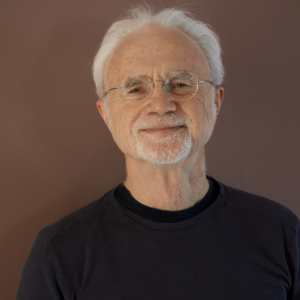
JOHN ADAMS
Composer, conductor, and creative thinker—John Adams occupies a unique position in the world of American music. His works stand out among contemporary classical compositions for their depth of expression, brilliance of sound, and the profoundly humanist nature of their themes.
Among Adams’s works are several of the most performed contemporary classical pieces today: Harmonielehre, Shaker Loops, Chamber Symphony, Absolute Jest, Short Ride in a Fast Machine, and his Violin Concerto. His stage works, many in collaboration with director Peter Sellars, include Nixon in China, The Death of Klinghoffer, El Niño, Doctor Atomic, A Flowering Tree, the Passion oratorio The Gospel According to the Other Mary, and Girls of the Golden West. Adams’s most recent opera, Antony and Cleopatra, featuring a libretto adapted by the composer from Shakespeare’s tragedy, receives its European premiere at the Gran Teatre del Liceu in fall 2023 in a production directed by Elkhanah Pulitzer and conducted by Adams himself.
This season, John Adams’s Frenzy for orchestra receives its world premiere with the London Symphony Orchestra and Sir Simon Rattle, who tour the work to multiple cities in Europe.
Adams is the 2019 recipient of the Erasmus Prize “for notable contributions to European culture, society and social science”—the only American composer to be so honored in the prize’s 61-year history. As an advocate of his composer colleagues Adams has premiered over 100 new works ranging from composers such as Glass, Riley, Rihm, Wolfe, and Gordon to works by young emerging composers. He received the 2021 Ditson Conductor’s Award from Columbia University in recognition for his “exceptional commitment to American composers.” Adams has additionally received honorary doctorates from Harvard, Yale, Northwestern University, Cambridge University, and the Juilliard School. Since 2009 he has held the position of Creative Chair with the Los Angeles Philharmonic. A provocative writer, he is author of the highly acclaimed autobiography Hallelujah Junction whose writings have appeared in both The New Yorker Magazine and the New York Times Book Review.
As a conductor of his own works and wide variety of repertoire, Adams has appeared with the Berliner Philharmoniker, Royal Concertgebouw Orchestra, London Symphony Orchestra, Wiener Symphoniker, the New York Philharmonic and the Los Angeles Philharmonic, and the orchestras of Seattle, Cleveland, and Rotterdam.
In 2022, Nonesuch Records released the 40-disc John Adams Collected Works, a box set of recordings spanning more than four decades of the composer’s career with the label.

PETER SELLARS
Director Peter Sellarshas gained international renown for his groundbreaking and transformative interpretations of classics, advocacy of 20th-century and contemporary music, and collaborative projects. His work illuminates the power of art as a means of moral expression and social action.
He has staged operas at the Dutch National Opera, English National Opera, Festival d’Aix-en-Provence, Lyric Opera of Chicago, Opéra National de Paris, and the Salzburg Festival, among others. He has also collaborated on the creation and production of many works with composers John Adams and Kaija Saariaho.
Recent productions include Tyshawn Sorey’s Monochromatic Light (Afterlife) for the Park Avenue Armory (New York), Heinrich Schütz’s Musikalische Exequien with the Los Angeles Master Chorale, a revival of Tristan und Isolde at the Opera de Paris, and a staging of Sorey’s Perle Noire: Meditations for Josephine at the Dutch National Opera. Upcoming in 2023/24 are new productions of Marc-Antoine Charpentier’s Medee in Berlin and Vincenzo Bellini’s Beatrice di Tenda in Paris.
Sellars has led several major arts festivals, including the 1990 and 1993 Los Angeles Festivals and the 2002 Adelaide Arts Festival. In 2006 he was Artistic Director of New Crowned Hope, a festival in Vienna for which he invited emerging and established artists from diverse cultural backgrounds to create new work in the fields of music, theater, dance, film, the visual arts, and architecture for the celebration of Mozart’s 250th birthday anniversary. He served as the Music Director of the 2016 Ojai Music Festival.
Mr. Sellars is a Distinguished Professor in the Department of World Arts and Cultures at UCLA and the founding director of the Boethius Institute at UCLA. He is the recipient of a MacArthur Fellowship, Erasmus Prize for contributions to European culture, the Gish Prize, the Polar Music Prize, and is a member of the American Academy of Arts and Sciences
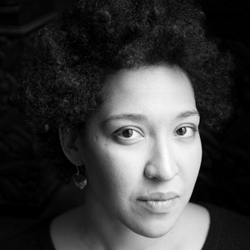
JULIA BULLOCK
American classical singer Julia Bullock has headlined opera productions worldwide, including Theodora at Covent Garden and The Indian Queen at the English National Opera, Bolshoi Theatre and Teatro Real. She created leading roles in the premiere productions of Michael van der Aa’s Upload, John Adams’s Girls of the Golden West, and Terence Blanchard’s Fire Shut Up in My Bones, and has starred in The Rake’s Progress, Doctor Atomic, and The Magic Flute, which she performed in concert with the LA Philharmonic and Gustavo Dudamel, and in a production by the late Peter Brook on tour in South America. Bullock has collaborated with the New York Philharmonic, Boston Symphony, Deutsches Symphonie Orchester Berlin, Bayerische Rundfunk, NHK Symphony, Philharmonia and London Symphony Orchestra, and has given extensive recital tours at venues including Carnegie Hall, Wigmore Hall, the Concertgebouw, and Elbphilharmonie. She is a much sought-after collaborator, curator and artist-in-residence by symphony orchestras, festivals, museums and music schools. One of Bullock’s major projects, Perle Noire: Meditations for Joséphine explores the roles of bigotry, prejudice, misogyny, racism, and ultimately finding one’s humanity through the self-empowerment of performance via the lens of Joséphine Baker’s life – conceived with Peter Sellars, Tyshawn Sorey and Claudia Rankine, the work is now finding a home in major operatic spaces. Bullock’s solo album debut, Walking in the Dark, was named among the best of 2022 by the New York Times.

CHRISTIAN REIF
Newly appointed Chief Conductor of the Gävle Symphony Orchestra, Christian Reif has established a reputation for his natural musicality, innovative programming and technical command.
The 2023/24 season marks Reif’s inaugural season as Chief Conductor of the Gävle Symphony Orchestra, a position he will hold through the 2025/26 season. He leads 7 programs with the orchestra including their season-opening concerts and a Swedish tour in March 2024.
Since 2022, Reif has served as Music Director of the Lakes Area Music Festival in Minnesota, a month-long summer festival committed to commissioning new works and to giving free concerts for the community with programming that ranges from opera and chamber music to symphonic performances.
Highlights of Reif’s 2023/24 season highlights also include subscription appearances with the Cincinnati Symphony Orchestra, St. Louis Symphony, Seattle Symphony, Milwaukee Symphony, Philharmonia Orchestra, Swedish Radio Symphony and Brno Philharmonic Orchestra plus summer festival appearances at the Grand Teton Music Festival and at Interlochen. Reif will conduct his own arrangement of John Adams’ El Niño with the Cincinnati Symphony, and with the American Modern Opera Company on tour to Stanford University, Yale University, Harriman-Jewel in Kansas City, and at the Cathedral of St. John the Divine in New York.

JONNY ALLEN
Jonny Allen is a Grammy-nominated percussionist whose contagious passion for music has been described as “a demonstration of raw power, virtuosity and feeling” by The New York Times. Jonny has won prizes at both the International Chamber Music Competition and the International Marimba Competition in Salzburg, giving respective performances at Carnegie Hall and Schloss Hoch in Flachau, Austria. He has also performed as a drum set soloist with Ghana’s National Symphony Orchestra at the National Theatre in Accra. Jonny performs regularly with his percussion quartet, Sandbox, and is a founding Core Member of the American Modern Opera Company (AMOC*). He is also a committed educator on percussion faculty and in residence at both the University of Missouri-Kansas City and The New School in Manhattan. Jonny holds a Bachelor’s degree and Performer’s Certificate from the Eastman School of Music, as well as a Masters degree and Artist Diploma from the Yale School of Music.

JOHN ARIDA
Pianist and coach John Arida has been praised by The Washington Post and The Philadelphia Inquirer for his interpretative prowess. His relationships with some of classical music’s most esteemed performers have led to international recital engagements across the United States, Canada, and Mexico. Notable venues include Carnegie Hall, The Kennedy Center, the Aspen Music Festival and Tanglewood. Arida’s 2023/2024 season include recital appearances with Julia Bullock, Isabel Leonard, Samantha Hankey, and Jack Swanson along with a scheduled return to the Santa Fe Opera working with Harry Bicket. Arida has held fellowships at the Aspen Music Festival and the Music Academy of the West. He holds a master’s degree in collaborative piano from The Juilliard School and a bachelor’s degree in vocal performance from SUNY Purchase. While maintaining a private studio in New York City, John is currently a full-time faculty member in the Vocal Arts division at the Juilliard School.

DOUG BALLIETT
Doug Balliett is a composer, instrumentalist and poet based in New York City. The New York Times described his compositions as “brainily bubble gum and lovable shaggy,” his poetry as “brilliant and witty,” and his bass playing as “elegant.” Doug is a professor of baroque bass and violone at The Juilliard School, and he leads the Theotokos ensemble every Sunday at St. Mary’s Church. He plays regularly with Les Arts Florissants, Jupiter Ensemble, ACRONYM, Ruckus, BEMF, Alarm Will Sound, and other ensembles. In 2021 five of his Ovid Cantatas were filmed for Qwest TV with William Christie, Lea Desandre, and Nick Scott. For three years he and his twin brother hosted a weekly show dedicated to living composers on WQXR’s new music channel Q2. Upcoming performances of his work include Beast Fights at Tanglewood with the Boston Symphony bass section, and the annual New Year’s Eve performance of his opera Gawain and the Green Knight.
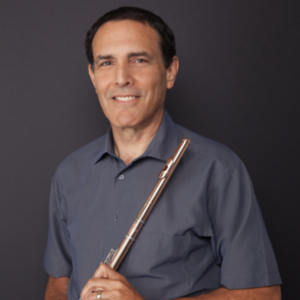
TOD BRODY
Tod Brody has had an active career as a flutist in Northern California since the 1970s. He currently serves as principal flutist of the San Francisco Chamber Orchestra, the Sacramento Opera, and the California Musical Theater, and makes frequent appearances with the San Francisco Opera and San Francisco Ballet orchestras, and in other chamber and orchestral settings throughout the Bay Area. Also a contemporary music specialist, Tod is principal flutist for the San Francisco Contemporary Music Players, Eco Ensemble, Earplay, and the Empyrean Ensemble. Tod was the flute instructor at UC Davis from 1992 until 2015, and still enjoys teaching and coaching privately. Tod has also served as Executive Director of the San Francisco Bay Area Chapter of the American Composers Forum, and as the first Executive Director of the contemporary opera company Opera Parallèle. Since 2016, he has been Executive Director of the Marin Symphony.

ANTHONY ROTH COSTANZO
Countertenor Anthony Roth Costanzo began performing professionally at the age of 11 and has since appeared in opera, concert, recital, film, and on Broadway. He was recently awarded a GRAMMY, an Honorary Doctorate from Manhattan School of Music, a visiting fellowship from Oxford University, and the History Makers Award from the New York Historical Society, and in the spring will be a distinguished visiting scholar at Harvard. This season, he returns to the Metropolitan Opera after staring in Akhnaten, in another title role as Gluck’s Orfeo ed Euridice, the Santa Fe Opera for a world premiere, and to the Teatro Real; makes his Paris Opera debut, gives solo recitals at the Kennedy Center and Boston’s Jordan Hall, makes his debut at the Wigmore Hall in London, and appears in Carnegie Hall with the Met Chamber Orchestra. As a producer, he has created projects for Opera Philadelphia, The New York Philharmonic, The BBC Proms, WQXR, and St. Ann’s Warehouse among others.
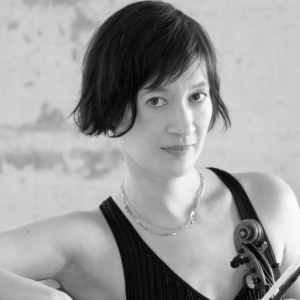
MIRANDA CUCKSON
A highly acclaimed soloist and collaborator, violinist/violist Miranda Cuckson delights audiences with her performances of music ranging from older eras to the most current creations. She performs at venues ranging from Suntory Hall to the Berlin Philharmonie to the Teatro Colón and Cleveland Museum, the St. Paul Chamber Orchestra’s Liquid Music, and the Ojai, Wien Modern, Grafenegg, Time Spans, Marlboro, Bard, West Cork, Portland, LeGuessWho, and SinusTon festivals. Miranda made her Carnegie Hall debut playing Piston’s Violin Concerto No. 1 with the American Symphony Orchestra, and just recently made her debut at the Vienna
Musiverein with the Haas Violin Concerto No. 2. She has released ten lauded albums, including Nono’s “La lontananza nostalgica utopica futura”, named a Best Recording of the Year by The New York Times. Miranda is a member of AMOC* and founder/director of Nunc. She studied at Juilliard and teaches at Mannes School of Music.

ALEXANDER DAVIS
Alexander Davis (he/him) is a New York City-based bassoonist whose artistic intentions center on space-making, connection, and community-building within classical music. An advocate of creating equity in the arts, Alexander is the founder and Artistic Director of the Sugar Hill Salon, a chamber music series showcasing black and brown wind artistry based in the culturally robust community of Harlem, NY, and on the stolen traditional territory of the Lenape Nation.
Alexander performed in the first all-black orchestra to ever hold a concert in the history of Carnegie Hall’s existence with the Gateway Festival Orchestra in April of 2022. He has played with American Composer Orchestra, St Paul Chamber Orchestra, The Knights, Harlem Chamber Players, Orpheus Chamber Orchestra, Tertulia Chamber Music, Albany Symphony, Detroit Symphony Orchestra, Princeton Symphony Orchestra, American Modern Opera Company, and more.
Alexander is adjunct bassoon faculty at Montclair State University and the Mannes School of Music Prep. He has studied at SUNY Fredonia, Stony Brook University, and Manhattan School of Music. He is currently a Doctoral Candidate of music at Stony Brook University.

JORDAN DODSON
Jordan Dodson, described by Performance Today as “one of the top young guitarists of his generation,” is a musician and educator. An advocate of contemporary music, Dodson has given the premiere of hundreds of new works. In 2013 he was the first guitarist to graduate from the Curtis Institute of Music’s new guitar program. In the same year he won Astral Artists’ National Auditions and was selected to be Young Artist in Residence on American Public Media. He has appeared on several commercially available recordings including Jason Eckardt’s Subject and Elliot Cole’s Nightflower and Journals, vol. 1.
Originally from Columbus, Ohio, Dodson is on faculty at EzraGuitar and The Smith School in New York City. He has given masterclasses and lectures and holds degrees from the Curtis Institute of Music, the Manhattan School of Music, and the University of Cincinnati, and his teachers have included Clare Callahan, David Starobin, and Jason Vieaux. Jordan is endorsed by Oasis strings and plays a Gary Lee guitar.
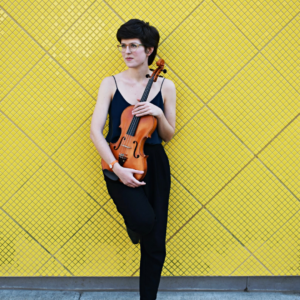
CARRIE FREY
Carrie Frey is a violist, improviser, and composer based in New York City. Frey is the violist of the Rhythm Method (“a group of individuals with distinct compositional voices and a collective vision for the future of the string quartet” – ICIYL) and a founding member of string trio Chartreuse and string quartet Desdemona. She has appeared with many of New York City’s notable new music groups, including Wet Ink Large Ensemble, AMOC*, Talea Ensemble, Wavefield, and International Contemporary Ensemble, and with Simone Baron’s genre-bending Arco Belo ensemble. Her compositions have been performed by the Rhythm Method, Adrianne Munden-Dixon, Kal Sugatski, and RE:duo. Her solo album Seagrass was released on Gold Bolus Records in December 2023. Carrie is a graduate of Oberlin Conservatory and the Manhattan School of Music Contemporary Performance Program and is currently pursuing a doctorate at the Graduate Center of the City University of New York.

RONI GAL-ED
Oboist Roni Gal-Ed has worked with leading conductors such as Zubin Mehta, Kent Nagano, Valery Gergiev, Rafael Frühbeck de Burgos, Christian Thielemann, Sándor Végh, and Yoel Levy. As a chamber musician she collaborated with Daniel Barenboim, Nikolaj Znaider, Johannes Moser, Mathieu Dufour, the Jerusalem String Quartet, and the Carmel String Quartet. Gal-Ed played with the Munich Philharmonic Orchestra under James Levine before becoming the Principal Oboist of the Bavarian Kammerphilharmonie, and a guest Principal Oboist with the Budapest Festival Orchestra under Ivan Fischer. She performed and toured with the Berlin Symphony Orchestra, the Bremen Kammerphilharmonie, the Australian Chamber Orchestra, and was a frequent guest Principal Oboist with the Stuttgart and Munich Chamber Orchestras. Back in her native Israel, she served as the Principal Oboist of the Israeli Opera, and then as Associate Principal with the Jerusalem Symphony Orchestra. In New York, Gal-Ed is a member of the Dorian Wind Quintet, the Jupiter Chamber Players, and the American Ballet Theater Orchestra.

CONOR HANICK
A fierce advocate for the music of today, pianist Conor Hanick has premiered over 200 pieces and collaborated with composers ranging from Pierre Boulez, Kaija Saariaho, and Steve Reich, to the leading composers of his generation, including Nico Muhly, Caroline Shaw, Tyshawn Sorey, Samuel Carl Adams, and Anthony Cheung. He recently performed with the San Francisco Symphony, Seattle Symphony, Alabama Symphony, Orchestra Iowa, and the Boston Modern Orchestra Project, been presented by the Gilmore Festival, New York Philharmonic, Elbphilharmonie, De Singel, Caramoor, Cal Performances, Philadelphia Chamber Music Society, and the Park Avenue Armory, and worked with conductors Esa-Pekka Salonen, Ludovic Morlot, Alan Gilbert, and David Robertson. This season Hanick performed with Jay Campbell, Joshua Roman, Seth Parker Woods, and the Takt Trio.
Hanick is the director of Solo Piano at the Music Academy of the West and serves on the faculty of The Juilliard School, Mannes College, and the CUNY Graduate Center.

COLEMAN ITZKOFF
Cellist and performer Coleman Itzkoff stands at the intersection of baroque/classical/new music, contemporary dance, and experimental theater. Whether premiering works by living composers and performing baroque music on historical instruments in the same concert, delivering enigmatic monologues in a piece of avant-garde dance theater, composing, arranging, and recording music for the Amazon film ‘Le Bal des Folles’, or simply playing solo Bach for hospital patients in the time of COVID, Coleman continues to push the boundaries of what it means to be a musician of the 21st century.
As a soloist, he has been featured soloist with many great orchestras, including recent appearances with the Houston, San Diego, and Cincinnati Symphonies. He is a dedicated member of the early music ensembles Ruckus and Twelfth Night, and is a founding member of AMOC. Coleman holds a Bachelors in Music from Rice University, a Masters in Music from USC, and an Artist Diploma from The Juilliard School. colemanitzkoff.com
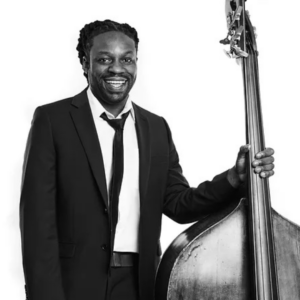
CHRISTOPHER JOHNSON
Bassist Christopher Johnson began his musical studies with Project S.T.E.P. in Boston at the age of 7 before studying at New England Conservatory with Don Palma and getting his master’s at Manhattan School of Music with Tim Cobb. He’s a member of Rootstock Republic, JP Jofre Quintet, Sphinx Virtuosi, The ReCollective Orchestra, Black Rock Philharmonic, New Haven Symphony Orchestra, Allentown Symphony Orchestra, and Classical Tahoe Orchestra. He has been a substitute bassist with New York Philharmonic, Philadelphia Orchestra, Pittsburgh Symphony Orchestra, Vermont Symphony Orchestra, Albany Symphony Orchestra, Harrisburg Symphony Orchestra, Wordless Music Orchestra, and Verbier Festival Orchestra just to name a few. He won 1st place at the International Society of Bassist orchestral excerpt completion, premiered the musical Jagged Little Pill at A.R.T., and played on the soundtrack of The Lion King with Hans Zimmer. Chris has performed with stars such as Jon Batiste, Bel Biv Dove, Chaka Khan, Earth Wind and Fire, The Roots, Ms. Lauryn Hill, Salt N Peppa, Joshua Bell, Rene Fleming, Midori Goto,and Yo Yo Ma, just to name a few.

GLEB KANASEVICH
Gleb Kanasevich is a clarinetist, composer, and noise/drone musician. He currently works primarily with feedback and modified instruments, while exploring expressive possibilities in very simple electronic processing. He is a permanent member of Hub New Music and often as a soloist and collaborates with composers, other chamber music groups, improvisers, noise musicians, death metal bands, and among others. Since 2013, he has been a core member of Ensemble Cantata Profana, where he served as co-directed for four years with Jacob Ashworth, before being named the ensemble’s Acting Artistic Director for the ensemble’s final 2022/23 season.
Most recently, he was commissioned by Ensemble Intercontemporain, Callithumpian Consort, Ah Young Hong, and No Exit New Music Ensemble. In 2020, he also released a new improvisation project for modified recorder and guitar amplifiers called Capacity. It is survived by fully composed follow-up works for cello and bass clarinet.
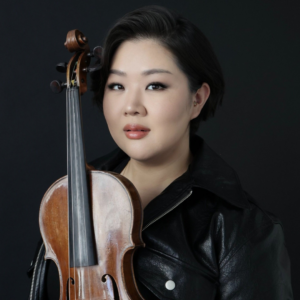
MIRAN KIM
Miran Kim joined the first violin section of the Metropolitan Opera Orchestra in 2014. She has held positions in the Houston Symphony and the Grant Park Festival Orchestra. She performs each summer at the Lakes Area Festival in Minnesota, where she serves as Concertmaster for opera performances.
Kim attended The Juilliard School’s Pre-College Division under the tutelage of Hyo Kang and Catherine Cho. Kim studied at The Juilliard School and The Cleveland Institute of Music, both under the tutelage of Joel Smirnoff, and at Rice University’s Shepherd School of Music, studying with Cho-liang Lin, before she won her position in the Houston Symphony. Additional teachers include Benny Kim, Paul Kantor, Ida Kavafian, and Sylvia Rosenberg.
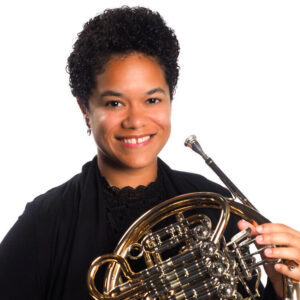
PRISCILLA RINEHART
Priscilla Rinehart is a freelance horn player based in New York City, with previous Bachelor and Master degree studies at The Juilliard School. She has performed in orchestras such as The Phantom of the Opera, Camelot, The Metropolitan Opera, The Knights, and Orchestra of St. Luke’s. Priscilla greatly enjoys the genres of contemporary and chamber music, having made appearances with Alarm Will Sound and Sugar Hill Salon, and is looking forward to her upcoming performances with AMOC* (American Modern Opera Company) in December.
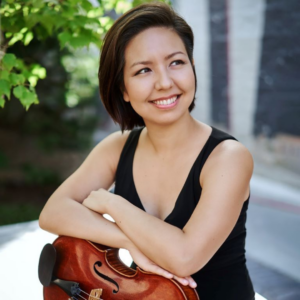
ZOË MARTIN-DOIKE
Violinist/violist Zoë Martin-Doike is currently in the viola section of the Metropolitan Opera Orchestra and has also frequently joined the Philadelphia Orchestra for tours of Europe and Asia. A passionate chamber musician, Zoë is a member of the critically acclaimed Iris Trio, which toured extensively in Canada, the U.S. and Germany. Previously, she was a founding member of the Aizuri Quartet which garnered top prizes at the Wigmore Hall International String Quartet Competition and held residencies at the Curtis Institute of Music and the Barnes. She also received top prizes at the Primrose International Viola Competition and the Lennox International Young Artist Competition, and most recently won the 2019 Kaleidoscope Chamber Orchestra Competition. Zoë attended the Marlboro Music Festival, the Steans Institute at Ravinia as well as the Sarasota, Norfolk, and Taos Chamber Music Festivals. Zoë did her undergraduate studies at the Curtis Institute of Music, where she served as concertmaster for the 2011-12 school year, and her master’s degree at the Jacobs School of Music at Indiana University.

QIANWEN SHEN
Violinis Qianwen Shen joined The Metropolitan Opera Orchestra in the 2019 Season. As an orchestra musician, Shen has performanced with Baltimore Symphony Orchestra, Boston Symphony Orchestra, New World Symphony, Minnesota Orchestra, and Montclair Orchestra. She served as concertmaster, Principal Second, and other leadership positions for the New World Symphony, New England Conservatory Philharmonic Orchestra, New England Conservatory Chamber Orchestra, Mannes School of Music, and Tanglewood Music Center. She has appeared in ensemble and solo performances at Carnegie Hall, Boston Symphony Hall, Victoria Theatre and Concert Hall of Singapore, Hong Kong Art Center Concert Hall, National Centre for the Performing Arts in Beijing China, Shanghai Music Hall, Shanghai Oriental Art Center. As a chamber musician, Shen has performed with the musicians from Cleveland Quartet, Emerson Quartet, Julliard Quartet, Takacs Quartet, and Peabody Trio.
Born in Bengbu, China, Shen began playing the violin at age of four. She studied at Shanghai Conservatory of Music, New England Conservatory, and Mannes School of Music.

DAVÓNE TINES
Heralded as a “singer of immense power and fervor” and “[one] of the most powerful voices of our time” by The Los Angeles Times, the “immensely gifted American bass-baritone Davóne Tines has won acclaim, and advanced the field of classical music” (The New York Times) through his work that blends opera, art song, contemporary classical, spirituals, gospel, and songs of protest, as a means to tell a deeply personal story of perseverance that connects to all of humanity. Called a “next generation leader” by Time Magazine and recently named Musical America’s 2022 Vocalist of the Year, Tines is a path-breaking artist at the intersection of many histories, cultures, and aesthetics.

KYLE SANCHEZ TINGZON
Filipino countertenor Kyle Sanchez Tingzon has been praised for his “powerful countertenor” (The Wall Street Journal) and his “lovely, plummy voice” (Opera Today). As a 2023 Young Artist with The Glimmerglass Festival, he made his company and role debut as Goffredo in Handel’s Rinaldo alongside world-renowned countertenor Anthony Roth Costanzo. As a 2022 Gerdine Young Artist with Opera Theatre of Saint Louis, he made his company and role debut as The Messenger in Stewart Wallace’s world premiere of Harvey Milk Reimagined and covered the Third Spirit in The Magic Flute. His current season includes work with the San Francisco Symphony Chorus, American Bach Soloists, and Philharmonia Baroque Chorale.
He has received prizes from the Loren L. Zachary Society National Vocal Competition, Handel Aria Competition, Rochester Oratorio Society Competition, and the Metropolitan Opera Laffont Competition.

JASMIN WHITE
Jasmin White’s is a current member of the premier Opernstudio at Volksoper Wien, performing from 2022-24 as Mary in Der fliegende Holländer, Frau Reich in Die lustigen Weiber von Windsor, Martha in The Gospel According to the Other Mary, and Dritte Dame in Die Zauberflöte. In 2023, Jasmin won first place in the Queen Sonja Singing Competition and 2nd place & audience prize in the Queen Elisabeth Competition, debuted at Teatro dell’opera di Roma as Erste Geist in Schumann’s Manfred, and performed as the mezzo-soloist in John Adams’ El Niño with Cincinnati Symphony Orchestra. In 2022, White made their debut as a featured soloist with the Los Angeles Philharmonic, as a soloist and ensemble member at The Metropolitan Opera, and with roles at Cincinnati Opera and Lakes Area Music Festival.
A citizen of the Cherokee Nation and TERO Certified Indigenous artist, hailing from Grand Ronde, Oregon, White is also a graduate of the Artist Diploma in Opera Studies program at The Juilliard School, the Master of Music in Voice program at Cincinnati College-Conservatory of Music, and the Bachelor of Music in Vocal Arts program at the University of Southern California.
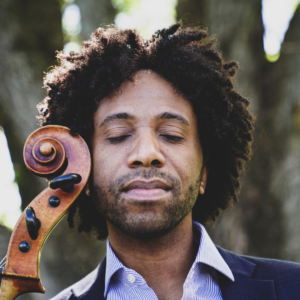
SETH PARKER WOODS
GRAMMY-nominated cellist Seth Parker Woods has established his reputation as a versatile artist and innovator across multiple genres. He is a recipient of the 2022 Chamber Music America Michael Jaffee Visionary Award. Woods serves on the faculty of the Thornton School of Music at The University of Southern California as Assistant Professor of Cello and Head of Chamber Music. He previously served on the faculties of the University at Buffalo, University of Chicago, Dartmouth College, and the Chicago Academy of the Arts and as Artist in Residence at the University of Miami’s Frost School of Music and Northwestern University – Center for New Music. Woods holds degrees from Brooklyn College, Musik Akademie der Stadt Basel, and a PhD from the University of Huddersfield. In the 2020-21 season, he was an Artist in Residence with the Kaufman Music Center, and from 2018-2020 he served as Artist in Residence with Seattle Symphony and Creative Consultant for the interactive concert hall, Octave 9: Raisbeck Music Center. Seth Parker Woods is a Pirastro Artist and endorses Pirastro Perpetual Strings worldwide.
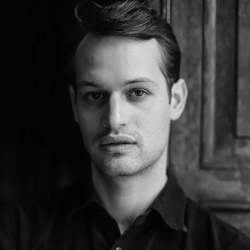
ZACK WINOKUR
With his work described as “pure poetry” (Boston Globe), stage director, choreographer, and dancer Zack Winokur is recognized as one of the most innovative and exciting talents working in opera today. Recent highlights include: Only an Octave Apart (“a glittering, disarming, poignant reminder of why theater exists”— W Magazine) featuring Anthony Roth Costanzo and Justin Vivian Bond with new arrangements by Nico Muhly at St. Ann’s Warehouse, the NY Philharmonic, and Opera Philadelphia; EASTMAN, a commission from Little Island’s inaugural festival centering the work and life of composer Julius Eastman; his “rich, seamless” (NY Times) production of The Black Clown, at the Mostly Mozart Festival at Lincoln Center and the American Repertory Theater; his “darkly captivating” (NY Times) production of Perle Noire: Meditations for Joséphine, by Tyshawn Sorey and Claudia Rankine, starring Julia Bullock on the grand staircase of the Metropolitan Museum of Art; and other productions at the Festival d’Aix-en-Provence, Santa Fe Opera, Dutch National Opera, Stanford Live. Winokur served as Artistic Director of NYPopsUp, a sprawling state Governor’s initiative to reopen the performing arts across NY State with over 300 free and public performances featuring hundred of artists from February to July 2021; and co-teaches, with Davóne Tines, a transdisciplinary storytelling class at Harvard.

RR SIGEL
RR Sigel is a performing arts consultant, collaborator, and creative producer who is interested in how media, performance, and interdisciplinary collaborations can be used to create a better understanding of the systems that surround us. Consulting and producing collaborators include: Sound Postings (the Office of Yo-Yo Ma), From the Top, Cal Performances, and other artists and organizations. In 2021, Sigel was Associate Artistic Director of NY PopsUp – a statewide festival designed to get artists back to paid performance, to bring the public back to connection with live art, and to develop new safety and public health protocols that can allow performance to resume as New York State emerged from the pandemic., Sigel was Executive Director of the International Contemporary Ensemble; a strategic business planning consultant with the National Park Service in the Great Smoky Mountains; and Manager, Social Innovation at the LA Phil where her focus was on the organization’s community-based music education program, YOLA. Additional background includes leadership development and backcountry tripleading. Sigel is a musical utility player – originally a bass player, she now prefers playing acoustic guitar at campfire singalongs.

BETSY AYER
Stage Manager Betsy Ayer’s previous projects with AMOC* include El Niño: Nativity Reimagined at the Cloisters and at the Cathedral of St. John the Divine in NYC, Eastman, El Cimarrón, Harawi, and The No One’s Rose. Recent projects with director Peter Sellars include Monochromatic Light (Afterlife), Park Avenue Armory; Idomeneo, Salzburg Festival; Only the Sound Remains, White Light Festival; andnumerous semi-staged productions with the San Francisco Symphony, Berlin Philharmonic, London Symphony Orchestra, andLos Angeles Philharmonic. Other recent premieres include Omar, Spoleto USA and Glass Handel, Opera Philadelphia. She has stage-managed for Brooklyn Academy of Music (BAM), New York City Opera. Dance stage management credits include: Four Quartets, Bard Summerscape and Barbican Centre, London; Trisha Brown Dance Company, FLEXN at the Park Avenue Armory/ International tour; New York City Ballet. Concerts: Interim Production Manager, Carnegie Hall. She is a graduate of Smith College.

CHRISTOPHER GILMORE
Christopher Gilmore designs for theatre, opera, live performance, and dance. Recent designs include “Seven Deadly Spins” (La Jolla Music Society), Luke Hickey’s A Little Old, A Little New (The Joyce @ Chelsea Factory, American Dance Festival, New Victory Dance Festival), With Care (92Y), Ensemble Connect Up Close: Through Movement (Carnegie Hall), CAGE (American Modern Opera Company), Dirty Rotten Scoundrels (New York Film Academy). Assistant/Associate: Trevor: A New Musical (Stage42), Assembly (Armory), Radio Golf (Two River), Log Cabin (Playwrights Horizons), also multiple productions at American Repertory Theatre and Huntington Theatre Company. Proud graduate of Emerson College.
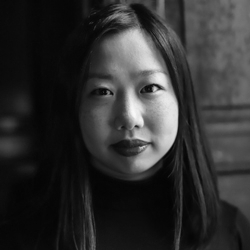
JENNIFER CHEN
Jennifer Chen completed her undergraduate degree at Harvard University (History of Art and Architecture cum laude) and is a 2017 MBA graduate of the Yale University School of Management. Her career has brought her from producing operas in dining halls to working with institutions including the Boston Symphony Orchestra, New York City Ballet, Peabody Essex Museum, Celebrity Series of Boston, Villa I Tatti (the Harvard Center for Italian Renaissance Studies), and Sound Postings (the Office of Yo-Yo Ma). Jennifer is also a Registered Piano Technician and graduate of the Piano Technology program at the North Bennet Street School.
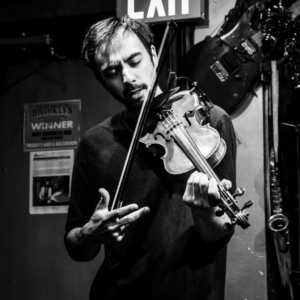
KEIR GOGWILT
Keir GoGwilt is a violinist, composer, and musicologist who was born in Edinburgh and grew up in New York City, where he currently lives. His work combines research and collaborative experimentation across a range of music and media. Known as a “formidable performer” (New York Times) with an “evocative sound” (London Jazz News) and “finger-busting virtuosity” (San Diego Tribune), he has soloed with the Basel Sinfonieorchester, Orchestra of St. Luke’s, Philharmonia Baroque Orchestra, Chinese National Symphony, Orquesta Filarmonica de Santiago, and the Boston Modern Orchestra Project. Recent composition projects include his album, hope lies fallow, with violinist Johnny Chang on Another Timbre, and Zarabanda Variations, which re-imagines music from New Spain/colonial Mexico. He is a founding member of AMOC and a resident composer with JACK Quartet for the 2023-2025 seasons. His research has been published in the Bach Journal, Current Musicology, and Naxos Musicology.
Reference Guide
A novelist, short-story writer, poet, essayist, and diplomat who was probably the most important Mexican woman writer of the 20th century. She was deeply compelled by the writings of Spanish 16th Century religious activist and author Saint Teresa of Avila and Sor Juana Ines de la Cruz. Learn more.
Written in 1950, this was an early collection of poems by Castellanos
A 2nd Century apocryphal text not appearing in the King James Bible or modern Reina Valera Bible, the Protevangelical Gospel of St. James tells the story of the birth, childhood, and early adolescence of Mary, mother of Jesus. The text featured in El Niño is drawn from Chapter 17. Read the full text here.
The primary English translation of the Old and New Testaments in current use. It was made in 1604—by a commission brought together by King James—in response to issues with earlier English language translations developed in the prior century.
Initially translated by former Catholic Monk Casiodoro de Reina in 1569 and revised by his student Cipriano de Valera in 1602, the Reina Valera Bible is the common Spanish-language translation of the bible used by Spanish-speaking protestants.
Living in Mexico in the 17th century, Sor Juana was a poet, dramatist, scholar, and nun, an outstanding writer of the Latin American colonial period and of the Hispanic Baroque. Learn more.
The Nicaraguan poet— who lived from 1867-1916 —is credited with initiating the Spanish-language literary movement of “modernismo” in the late 19th century. Learn more.
On October 2, 1968 in the Tlatelolco section of Mexico City, the Mexican Armed Forces opened fire on a group of unarmed civilians in the Plaza de las Tres Culturas who were protesting the upcoming 1968 Summer Olympics. 300 people —most of them students—were killed. Learn more.
Aztec goddess who represented sexual impurity and sinful behavior. Learn more.
The Gospel of Pseudo-Matthew (Ps. -Mt.) is one of the most important witnesses in the Latin West to apocryphal stories about the lives of Mary, Joseph, Jesus, and Mary’s parents, Anna and Joachim. Learn more.
A collection of Rosario Castellanos poems, El rescate del mundo (The Ransom of the World), was published in 1952; these are short, spare poems that provide rare descriptive tributes to indigenous women and their work. Learn More.
“…elevated an already-revisionist work into something much more powerful”
The New York Times
Upcoming tour performances:
December 21, 2023 at Cathedral of St. John the Divine, New York, NY. Learn More



